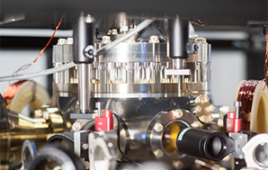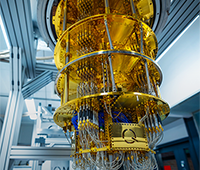Four Loyola University Maryland faculty members have been awarded a $280,120 grant from the National Science Foundation (NSF) to build a high-performance computing (HPC) cluster that will exponentially expand research opportunities for faculty and students across disciplines.
Once in place, the HPC cluster will make essential computing power immediately available for research projects identified by the grant recipients in their proposal to NSF. Loyola researchers did not previously have this level of computing power available to them locally, and therefore would rely on outside computing resources—which could delay results—or largely consider projects that could be studied within existing resource constraints.
“So many of the questions we’re trying to answer today, and the problems we’re trying to solve, require computationally-intensive modeling and programming that can be tremendously challenging on traditional desktop computers,” said Megan Olsen, Ph.D., assistant professor of computer science and principal investigator on the grant. “Our new HPC cluster will eliminate those resource barriers, significantly expanding opportunities for faculty research, faculty recruitment, and student research—all with the potential to advance knowledge, understanding, and innovation that extends far beyond the initial projects we are considering.”
Olsen’s co-awardees are Biggi Albrecht, Ph.D., associate professor of chemistry; David Binkley, Ph.D., professor of computer science; and Jeremy Schwartz, Ph.D., associate professor of economics. Their research projects, along with seven additional projects led by other faculty in their departments and faculty from physics and engineering, will be the first to run on the HPC cluster. Training will then be offered to any Loyola faculty member interested in tapping the HPC cluster for research purposes.
Undergraduate students at Loyola interested in research will receive training and mentorship, too. This is critical because students do not have access to the outside research computing resources available to faculty. The HPC cluster will both enhance the numerous existing research opportunities for undergraduate students and create new research opportunities in a broad range of disciplines.
“Our students will now have access to HPC cluster resources similar to what they would find at a large research university,” said Olsen. “This is really the future in a lot of different fields.”
Olsen cited the emerging field of digital humanities, which consists largely of analyzing voluminous sets of documents to find related pieces of information. HPC clusters are ideal for research of this kind.
An HPC cluster consists of multiple computers networked together so they can run comprehensive analyses from one user or many users simultaneously without compromising performance or speed. Users log into an HPC cluster remotely; the physical cluster is tucked away in a server room, doing the heavy computational lifting out of sight. Loyola’s HPC cluster will primarily be supported by George Hall, ’98, MES ’02, system administrator for the computer science department, and could be up and running as early as the end of the fall 2016 semester.
Olsen and her colleagues worked with Loyola’s office of research and sponsored programs to identify other faculty who needed additional computational power for their research projects. That process, including writing and submitting the grant, took more than a year. Olsen said the award, which was made through NSF’s Major Research Instrumentation Program, affirms the importance of their efforts.
“When we found out we actually got the grant—and we would have access to this computational power—it was fabulous.”



